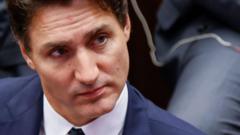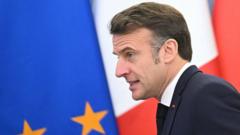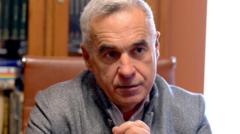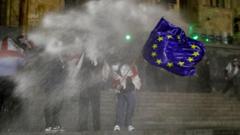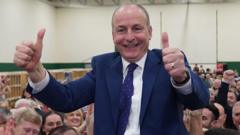The collapse of the "traffic light" coalition raises questions about economic stability and the potential for early elections, with implications for both domestic and international relations.
**Political Turmoil in Germany: Scholz's Leadership Under Threat After Coalition Breakup**
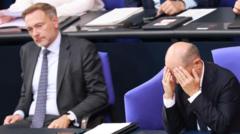
**Political Turmoil in Germany: Scholz's Leadership Under Threat After Coalition Breakup**
Chancellor Olaf Scholz's decision to dismiss Finance Minister Christian Lindner signals deep unrest within Germany's coalition government.
Germany’s political landscape has shifted significantly as Chancellor Olaf Scholz announced the dismissal of Finance Minister Christian Lindner, leading to the collapse of the governing coalition. Scholz expressed a profound lack of trust in Lindner—who represents the Free Democratic Party (FDP)—stating that the minister prioritized his party's interests over the nation's welfare. This move leaves Scholz’s Social Democrats and their coalition allies, the Greens, without a parliamentary majority, prompting a vote of confidence scheduled for January 15.
The current crisis is viewed as the climax of escalating tensions that have simmered for several weeks within what is known as the "traffic light" coalition. This coalition has been in power since 2021, bringing together Scholz’s Social Democrats, the environmentally-focused Greens, and the economically liberal FDP. As each party sought to advance its agenda, they found themselves at odds, particularly following external pressures from geopolitical events such as the Russian invasion of Ukraine. The war's impact has significantly shaken Germany's economic footing, pushing the nation towards a potential recession for a second consecutive year.
With Scholz's dismissal of Lindner and his accusations that the Finance Minister has "betrayed my confidence," the Chancellor is placing the onus on his administration to demonstrate reliability on a global stage, especially in light of recent developments in the United States following Donald Trump's election, which Scholz described as a factor leading to economic uncertainty. Lindner, for his part, argued that Scholz is steering Germany into a precarious phase of instability.
The coalition's ambitions included collaborative financial strategies, but diverging visions for Germany’s future have surfaced. While Scholz and the Greens advocate for relaxed fiscal policies to boost spending, Lindner has pushed for aggressive cuts to welfare in exchange for tax reductions. As tensions within the coalition escalate, Economy Minister Robert Habeck of the Greens has declared that they will remain in the government, despite the turmoil.
The upcoming vote of confidence could precipitate early elections, potentially reshaping Germany's political dynamics and addressing urgent economic challenges. If the government is voted down, the country would shift from its originally scheduled vote in September to an immediate electoral process, underlining the high stakes involved in the current political impasse.
The current crisis is viewed as the climax of escalating tensions that have simmered for several weeks within what is known as the "traffic light" coalition. This coalition has been in power since 2021, bringing together Scholz’s Social Democrats, the environmentally-focused Greens, and the economically liberal FDP. As each party sought to advance its agenda, they found themselves at odds, particularly following external pressures from geopolitical events such as the Russian invasion of Ukraine. The war's impact has significantly shaken Germany's economic footing, pushing the nation towards a potential recession for a second consecutive year.
With Scholz's dismissal of Lindner and his accusations that the Finance Minister has "betrayed my confidence," the Chancellor is placing the onus on his administration to demonstrate reliability on a global stage, especially in light of recent developments in the United States following Donald Trump's election, which Scholz described as a factor leading to economic uncertainty. Lindner, for his part, argued that Scholz is steering Germany into a precarious phase of instability.
The coalition's ambitions included collaborative financial strategies, but diverging visions for Germany’s future have surfaced. While Scholz and the Greens advocate for relaxed fiscal policies to boost spending, Lindner has pushed for aggressive cuts to welfare in exchange for tax reductions. As tensions within the coalition escalate, Economy Minister Robert Habeck of the Greens has declared that they will remain in the government, despite the turmoil.
The upcoming vote of confidence could precipitate early elections, potentially reshaping Germany's political dynamics and addressing urgent economic challenges. If the government is voted down, the country would shift from its originally scheduled vote in September to an immediate electoral process, underlining the high stakes involved in the current political impasse.


